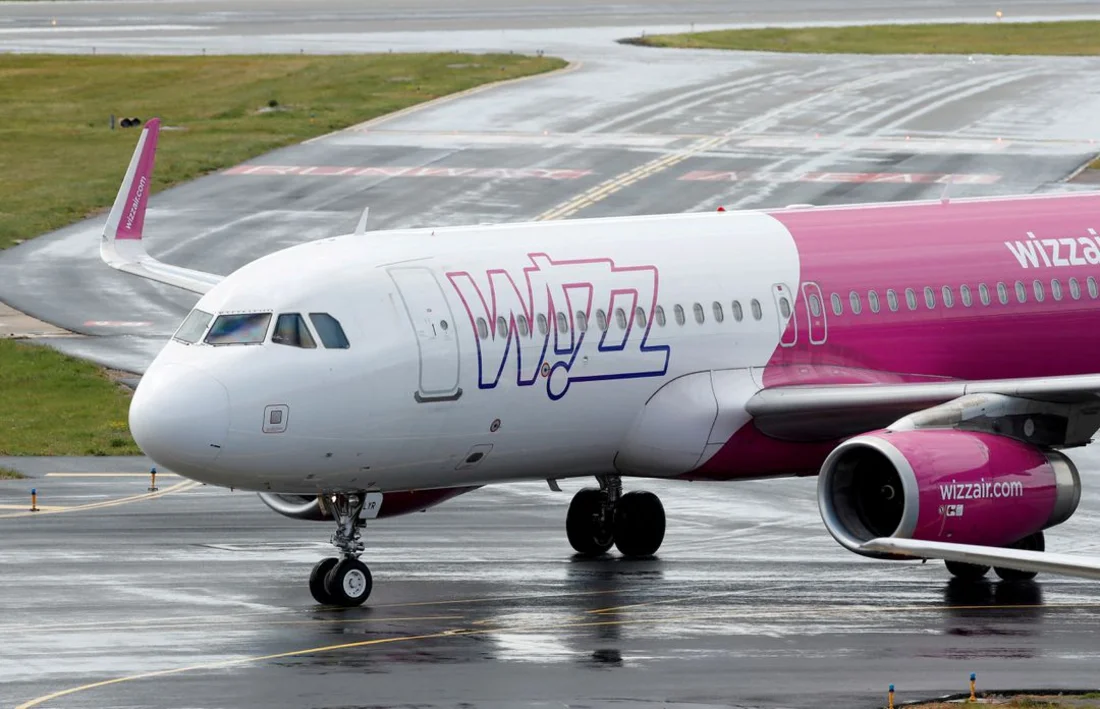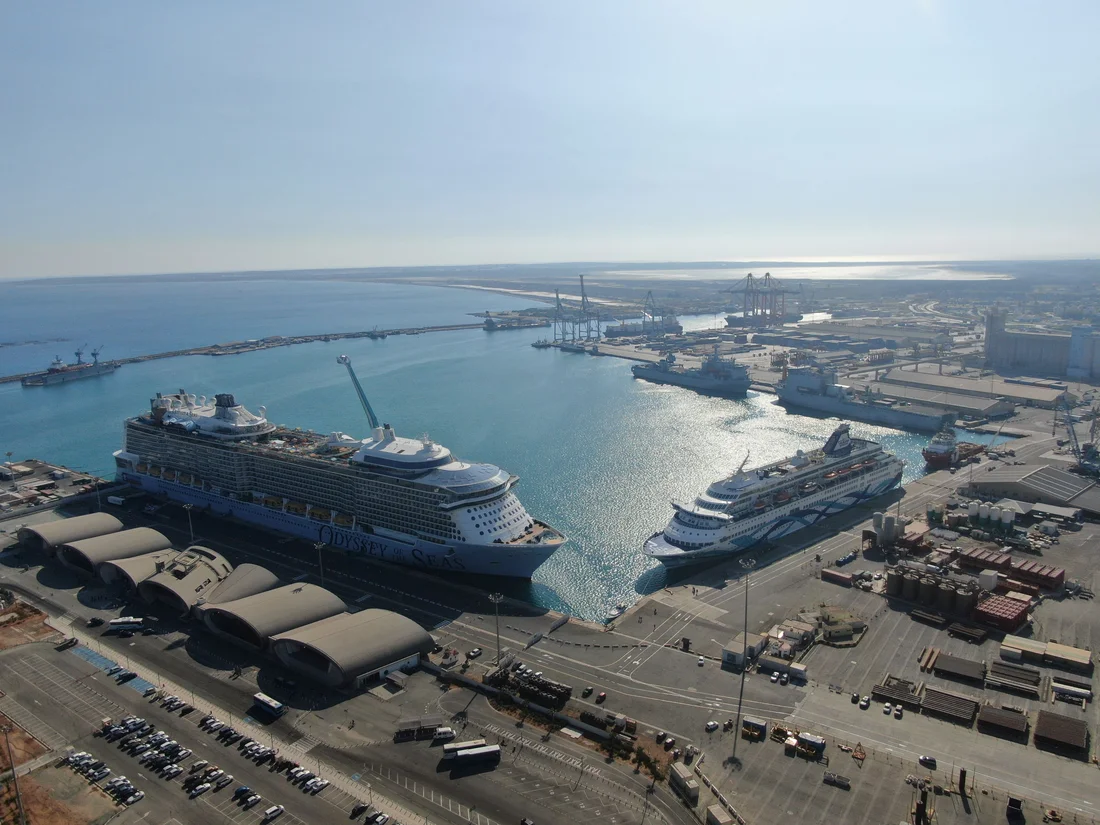Cyprus is establishing itself as a dynamic and efficient supply chain hub for Southeast Europe, supporting commercial connections between the new European corridors and the Eastern Mediterranean region.
Four decades of growth in air, sea and road traffic have seen Cyprus continuously develop and upgrade its critical infrastructure. This is crucial, because as an island nation Cyprus relies heavily on its transport links via extensive air connections and its sophisticated multipurpose ports crucial to export and import activities. The island will soon be at the end of two new European corridors and being a transportation gateway due to the country’s geostrategic location and through its strong regional and global maritime expertise, has the necessary characteristics to transform into a logistics hub for Europe and beyond. Having partnered with international companies in energy, Cyprus is shaping its transport and energy masterplan that aims to upgrade the country’s road, port, airport, and energy infrastructure. The country’s ports will no longer be only transportation hubs, but also energy hubs that manage the flow of energy serving urban nodes and industrial parks, acting as suppliers in a multi-fuels approach supporting the circular economy. Furthermore, Cyprus’ shipping expertise can be of value in the effort to transform the island into a freight and logistics hub by supporting the cooperation of stakeholders of Europe’s logistic chains, bringing it closer to regional and international levels through Asia, Middle East and Africa.
Geostrategic Location
Conveniently located at the intersection between Asia, Europe and Africa, and along the trade routes to the Levant, North Adriatic and Black Sea, Cyprus is easily accessed with minimum diversion from main arterial routes. This coupled with the country’s stability, good infrastructure, and pro-business stance has boosted its status as a prominent regional base for cost-effective cargo transport and processing. Cyprus’ potential as a transhipment hub is also becoming evident, as manufacturers and distributors realise that while the island economy itself may be small it is only an hour’s flying time from 200 million potential customers, and four hours’ flight time from over 2 billion people.
In addition to cargo transport, Cyprus is a top-tier destination port for some of the biggest cruise ships in the world and has two international airports with access to around 40 countries and markets around the world. The air transport sector, which was hard hit by the Covid pandemic, has seen a healthy increase in the last year and the two airports registered just over 11 million passengers in 2023. Following natural gas discoveries in its waters, the island has attracted some major global players like ExxonMobil, ENI, Shell and Total who have chosen the island as the natural service centre for their regional operations, taking advantage of Cyprus’ specialised logistics and port services for this growing industry.
New European Corridors
The completion of the Trans-European Transport Network (TEN-T) remains one of Cyprus’ key priorities. Trans-European transport links increase the potential to generate trade, foster economic growth and boost competitiveness. It encompasses several components, such as improving regional development strategies, strengthening technical capacities, building international partnerships, and fostering regional and international activities promoting the realisation of large infrastructure projects. The TEN-T Regulation is currently under revision aiming for an efficient and climate-smart transport system across the European Union and beyond, and the network is expected to be in place in June 2024. This will place Cyprus at the end of two European corridors: The Western Balkans-Eastern Mediterranean Core Network Corridor through Greece, and the Western Balkans towards Italy and Austria, and the Baltic Sea-Black Sea-Aegean Sea Core Network Corridor through Greece, Bulgaria, Romania, Poland, and Ukraine towards Finland. Cyprus can play a leading role in the realisation of these corridors, linking the East Med region with the EU, through this enhanced connectivity to both the Balkan and Baltic regions.
Upgraded Ports
The key ports of Cyprus are Limassol and Larnaca, with the addition of bulk ports and oil terminals at Vasiliko, Dekelia and Moni. Limassol is the main port handling around 90% of export and import volumes with an annual handling capacity of 500,000 twenty-foot equivalent units (TEUs), while Larnaca’s capacity is around 250,000 TEUs. The Cyprus port sector has been performing well in the last few years following the commercialisation of Limassol Port and the redevelopment plans of Larnaca Port.
Cyprus has an outstanding reputation as a maritime centre and has built on that experience to develop Limassol port into a state-of-the art facility, equipped to compete with regional rivals such as Piraeus and Haifa. DP World Limassol, in partnership with G.A.P. Vassilopoulos Ltd, operates three core areas of the port: oil and gas, the cruise sector and domestic cargo. DP World Limassol has been pouring investment into all aspects of the port, including offshore oil and gas, multipurpose general cargo, roll-on and roll-off, and further development of the new cruise terminal inaugurated in 2018, which enabled the largest cruise ships in the world to visit the country for the first time.
The port has been performing well and 2022 marked one of the best years for DP World Limassol, with cruises increasing by 46% and passengers by 338%, while total cargo tonnage volumes rose by a healthy 63% compared to the previous year. Also, the port’s maritime trailer transport (roll-on and roll-off multipurpose) traffic grew by a 162% year-on-year.
Operating the container port is Germany’s Eurogate International GmBH, in partnership with Interorient Navigation Company Ltd and East Med Holdings SA, who have invested almost €20 million in a state-of-the-art IT system, which processes information flow at high speed between customs, clearance and customer. It also enables the latter to locate a container at any time during the clearance process and take possession of it just 20 minutes after the ship carrying it has berthed. The acquisition of bigger, super-post-Panamax cranes, capable of servicing vessels 23 or more containers wide, has further enhanced the terminal’s efficiency, enabling it to attract the larger transhipment vessels now in use.
The operators of Limassol’s redeveloped port have capitalised on the increased importance of the region in world shipping. This increase was due to enhanced trade, regional port expansions, the discovery of natural gas deposits in East Med waters and the expansion of the Suez Canal, which handles over 10% of global maritime trade. The investment in expanding and modernising Limassol port has boosted competitiveness and will help generate around €2 billion for state coffers over the next 25 years.
Cyprus’ second-largest port is in Larnaca, just 2km from the town centre and 6km from the island’s largest airport, offering services such as handling break-bulk, dry-bulk, general cargo, roll on-roll off and oil and gas services. Its 326-metre North Quay is equipped with a crane on rails, while the 340-metre South Quay has a similar crane and a ramp suitable for ro-ro ships. In 2020, Cyprus reached an agreement with Israeli investors for the long-awaited €1.2 billion redevelopment of Larnaca port and marina, one of the island’s largest infrastructure projects of its kind. The tender-winning Cypriot-Israeli consortium Kition Ocean Holdings has eco-viable plans to restructure Larnaca marina, the port and surrounding land. Once completed, the redeveloped port will consist of 10 piers, a state-of-the-art passenger building and will use environmentally friendly ship loading and unloading equipment. The existing infrastructure of the port will be upgraded in terms of sea area and internal road network and storage areas. Meanwhile, new infrastructure will be created with expansion of the quays, construction of new buildings and utilisation of the port for cargo management, mooring services, and loading/unloading of ships and storage. The development should be in full swing in 2024.
The build-operate-transfer (BOT) project involves UK-based Prosperity Group, a Cypriot-owned company with extensive experience in international large-scale mixed-use developments and Israel’s REM International which is part of the group that owns and manages the port and marina of Eilat in Israel. Under the proposed venture, it is estimated that the state will receive more than €19.6 billion during the lifetime of the project. The BOT project will see the government receiving a fixed rent and a percentage of the revenue generated through a concession agreement with the port/marina operated on a 40-year lease and the real estate acquired on a 125-year lease.
Transhipment Hub
Thanks to its strategic geographical location and modern infrastructure, Cyprus has developed into a convenient transhipment centre for Europe-Far East trade and has strengthened its position as a key EU outpost in the Eastern Mediterranean region. The rapid modernisation and expansion witnessed at Cyprus’ main port at Limassol and its two airports, at Larnaca and Paphos, have coincided with growth of logistics services companies. They are investing heavily in technology, equipment and warehousing, in response to growing demand for transhipment, processing and re-export services.
A leading company in this field is Eurofreight Logistics. Its main focus is on consumer-products logistics, providing warehousing and distribution services, with additional expertise in temperature-controlled and frozen food logistics. Pharma logistics account for around 20% of Eurofreight’s business. As well as facilitating trade between East and West, the company has clients in countries such as Germany, Switzerland and the United Kingdom that send pharmaceuticals and cosmetics to Cyprus for processing and then have them sent back home. Even with transportation costs, it is still cheaper for such companies to process their products in Cyprus, thanks to tax savings.
Another major transport and logistics company is G.A.P. Vassilopoulos Group, which handles the multipurpose terminal at Limassol port with DP World Limassol, and marine services there with P&O Maritime. The group provides sea freight, air freight and land forwarding services, as well as specialising in freight forwarding by air and land, warehousing and distribution throughout Cyprus and worldwide.
Supporting Oil and Gas Exploration
Cyprus’ transport and logistics sector has already seen big benefits from the discovery of natural gas in Cypriot, Israeli and Egyptian waters – even before all these resources have been extracted and monetised. Cyprus-based logistics companies have been able to capitalise on the island’s geographical advantages to offer specialised support to oil and gas companies such as ExxonMobil and ENI as they operate both in Cyprus’ own offshore gas fields and those of its regional neighbours. For instance, the operations of ENI in Egypt’s giant Zohr gas field and Israel’s Leviathan and Karish shore bases have been supported by facilities in Limassol port.
As the search for offshore natural gas accelerates, Limassol port enjoys a strong competitive advantage as the logistics base for the increasing number of multinational oil and gas giants and service companies drawn to the island. International port operator DP World Limassol has already provided Cyprus with significant added muscle as the island strives to become the region’s pre-eminent energy services and trading hub. An onsite oil and gas logistics base has also been established at Limassol port. It is a multi-user logistics area that includes a 430-metre dedicated berth to oil and gas activities, mobilisation/demobilisation operations, open bonded and covered storages and warehouses, offices and drilling liquid production facilities to support oil and gas operations and offshore explorations in the Eastern Mediterranean.
The Government has also been working towards the establishment of the port terminal at Vasilikos/Zygi, the island’s main port for handling of industrial cargo and fuels. Together with the Cyprus Ports Authority, it has drafted a strategic plan for the development to utilise the prospects generated from the new role of Cyprus in natural gas developments in the Eastern Mediterranean, including hydrocarbon findings in its Exclusive Economic Zone (EEZ). This plan takes into consideration the construction of a Floating Storage Regasification Unit (FSRU) and includes the expansion of the existing port facilities, the introduction of LNG Bunkering, including facilities for the use of LNG as maritime fuel and the upgrading of the road network linking to the port.
Growing Fuel Terminal
The island’s reputation as a leading logistics and support provider for the oil and gas industry in the East Med is complemented by its emerging role as a centre for the processing, storage and re-export of fuel. This is largely due to the development of a sophisticated €300-million fuel distillation terminal at Vasilikos. It is operated by VTTV, the Cyprus subsidiary of Dutch multinational VTTI, and processes so-called ‘white’ or ‘clean’ products that have already been refined, such as diesel or middle distillates. These are shipped to Vasilikos from producers in the Gulf and the former soviet states and are then blended or modified to meet the specifications of the European market. VTTV is the first energy terminal of its kind in the Eastern Mediterranean which connects Europe and the Black Sea with markets in the Middle East and Asia.
Product fuel oil from the Black Sea area heading to markets in Asia must first be transported in small ships because of shallow waters in the Bosporus. At Vasilikos, VTTV helps to ‘build bulk’ and processes the cargo to the correct specifications for it to be exported economically via much larger vessels to the more distant markets of Asia. The existing VTTV terminal consists of 28 tanks and has a capacity of 545,000 cubic metres and has four jetties. It offers deep water access, up to Suezmax, and road tanker loading facilities.
These facilities mean that it is ideally placed to benefit from the growth in ship-to-ship cargo transfer operations in the region. Most transfers take place offshore, saving on port fees but this can be difficult and dangerous in bad weather and can lead to environmentally damaging oil spills. VTTV’s purpose-built jetty provides a safer, less environmentally hazardous alternative.
Air Connectivity
Cyprus’ two international airports broke records in 2019, with Larnaka (LCA) and Pafos (PFO) together handling an unprecedented 11 million passengers, constituting a 60% increase in passenger traffic from 2013. And the record was broken again in 2023, with a 3% increase, as passenger traffic rose to 11.6 million – and average of 32,000 passengers a day. The smooth operation of these airports is vital to the island’s economic prosperity, built on a flourishing tourism industry and an expanding centre for international trade and global business. Over 70 airlines fly from Cyprus to around 40 countries and over 100 destinations. Through their operations, Larnaka and Pafos contribute approximately 4% to the country’s GDP whilst it is estimated that almost 20,000 jobs are sustained at the two airports and in the wider tourism industry of Cyprus.
With regards to aviation, Cyprus is placing strong focus not only on economic and connectivity recovery but also on the environmental impact of aviation. Economic growth and emissions are basic pillars of the aviation sector, and the government is promoting solutions for the optimisation of capacity, procedures and routes, to contribute to the achievement of the aviation industry’s sustainability goals and reach climate neutral aviation targets by 2050. All current and future airport development projects for Larnaka and Pafos International Airports consider the commitment to the Net Zero by 2050 goal, which was strengthened by the signing of the Toulouse Declaration on future sustainability and the decarbonisation of aviation.
Key East Med Hub
Cyprus has developed an efficient business environment and can draw on a deep pool of highly qualified human talent. With a pro-business government committed to safeguarding the island’s attractive, EU-approved tax regime, Cyprus is attracting more players and investors to support the expansion of its transport and logistics sector – with enormous potential in attracting more transhipment cargo.
Leveraging on its geostrategic position, excellent infrastructure and improved connectivity has had a major impact in the increase of tourism, the growth of trade, investment, and productivity of the island. Increased annual passenger traffic, road network usage and freight movement have helped the heighten the role Cyprus can play in the region. The further development of its critical infrastructure networks and services as well as the flow of foreign direct investment into the country play an essential role as economic growth engines – and in establishing Cyprus as the key transport and logistics hub in the East Med.
January 2024
For more information, contact Cyprus' investment promotion agency, Invest Cyprus.
All rights reserved. The material on this site may not be reproduced, distributed, transmitted, cached, or otherwise used, except with the prior written permission of The Profiler Group.











